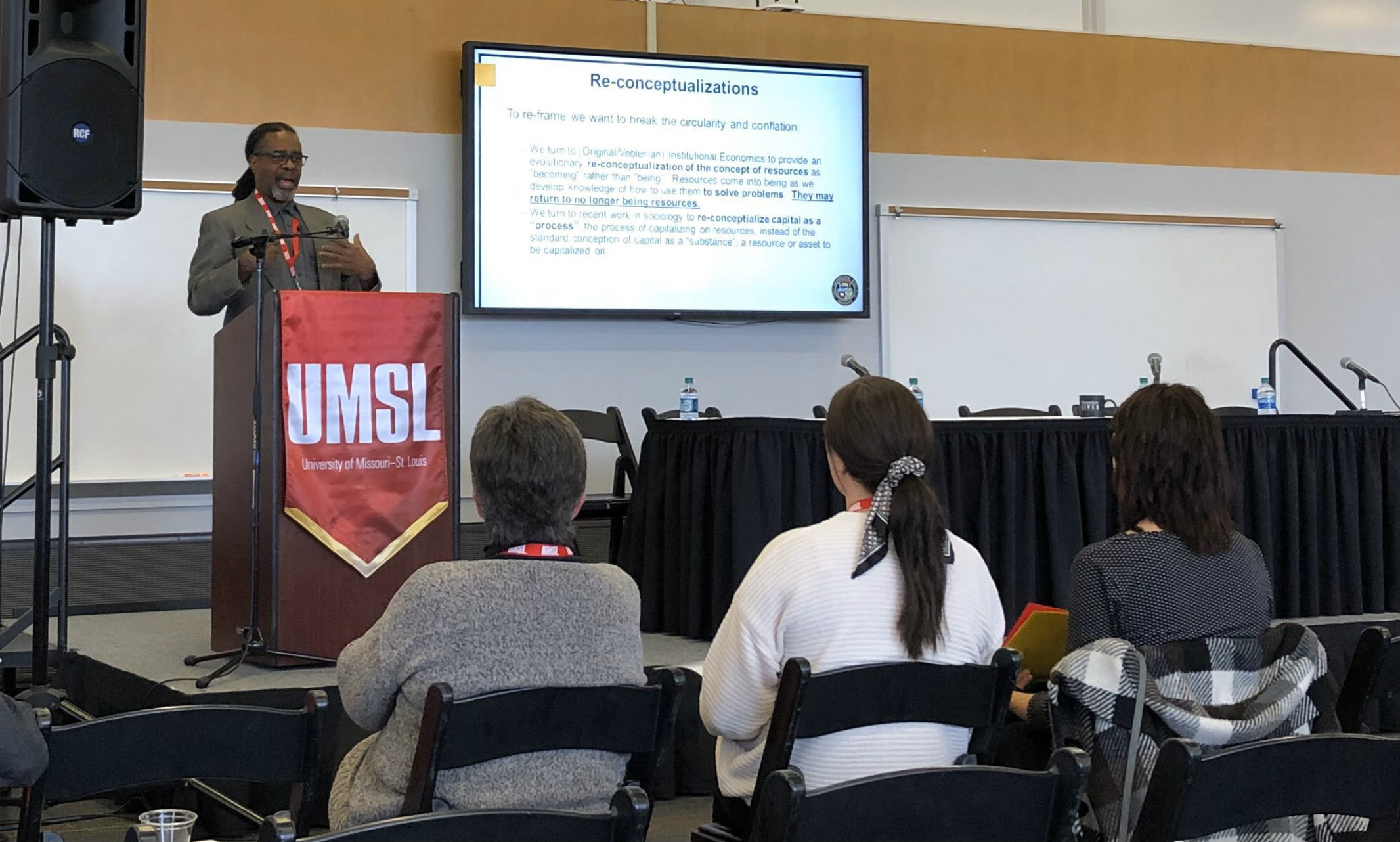Four University of Missouri-Kansas City professors from the College of Arts and Sciences presented their research at the UM System Collaborative Summit, “Converging Disciplines to Support Sustainable Development Goals (SDGs),” Nov. 20 at the University of Missouri-St. Louis.
In 2015, member states of the United Nations adopted “The 2030 Agenda for Sustainable Development” to support global action toward peace and prosperity for all nations. The agenda includes 17 Sustainable Development Goals (SDGs) to guide the global community in critical action to sustain the health and wellness of our planet and its inhabitants. The UM System Research Summit focused on several of these goals, including: no poverty; zero hunger; quality education; gender equality; affordable and clean energy; decent work and economic growth; reduced inequity; and peace, justice and strong institutions.
Presentation topics and brief descriptions for the four UMKC professors at the UM System Collaborative Summit are listed below. View session one and session two from the summit on YouTube.
Caroline Davies, associate professor, Department of Earth and Environmental Studies, on “Teaching the Sustainability Development Goals through Undergraduate Research and Community Engagement.”
The presentation described community engagement via a large format course around sustainability and the impacts of hands-on projects for students and community partners. To date there have been nearly 600 sustainability projects across the Kansas City metropolitan area.
Linwood Tauheed, associate professor and IPh.D. director of Economics, on “The ecological and community economic development: A methodological reconciliation.”
There is a significant conflation in the definitions of three concepts – resources, assets and capital – both in economic theory and in common usage. This conflation creates a cognitive frame in how the use of resources is discussed, which is biased in favor of increased resource usage, and leads to justifications for risk-taking behavior associated with increased resource usage and its effect on the global climate. A reconceptualization in the definitions of resources, assets and capital can help to normalize the framing around resource usage, and help bring to the forefront the liabilities of increased resource usage. This is a reconceptualization needed within ecological economics, if it’s to generate public support for its goal of creating an environmentally sustainable economy that simultaneously improves human well-being.
Jacob Marszalek, associate professor of Psychology, on “Promoting the development and assessment of social justice advocacy.”
A cornerstone for building institutions that promote peaceful and inclusive societies for sustainable development is to help their individual members (e.g., those in the helping professions) develop social justice advocacy (SJA), a pillar of Development Education. An important component of any type of education is assessment, and the Social Issues Advocacy Scale (SIAS; Nilsson, Marszalek, Linnemeyer, Bahner, & Misialek, 2011) was developed to measure the competency of SJA in students in the helping professions, and has been translated and used both nationally and internationally. The SIAS has been used to develop mastery profiles of SJA in students in clinical and counseling psychology, nursing and education, which may be used to assess growth in SJA attributes over the course of an academic program. The scale has been further developed into the SIAS-2 to account for a broader array of SJA dimensions, and ongoing research is refining a short form version for greater usability.
Sunghyop Kim, professor of Architecture, Urban Planning and Design, on “Equity in transportation mobility and safety: Issues in an aging Society.”
Aging population poses substantive equity issues. Safe mobility is critical to ensure a good quality of life regardless of one’s age. However, older adults often must deal with transportation disadvantages. Older adults who cannot drive face significant mobility challenges. A significant increase in bankruptcy rate and a growing financial insecurity among older adults pose added concerns. Gender and racial gaps in mobility exist among older adults. Older women, older minority women in particular, are more vulnerable than older men in meeting their mobility needs. Older adults aged 65+ are more likely than any other age groups to be fatally injured in pedestrian crashes. A number of recommendations have been made to address older adults’ transportation issues. However, specific strategies to promote safe and affordable mobility of older adults are still underexplored.

